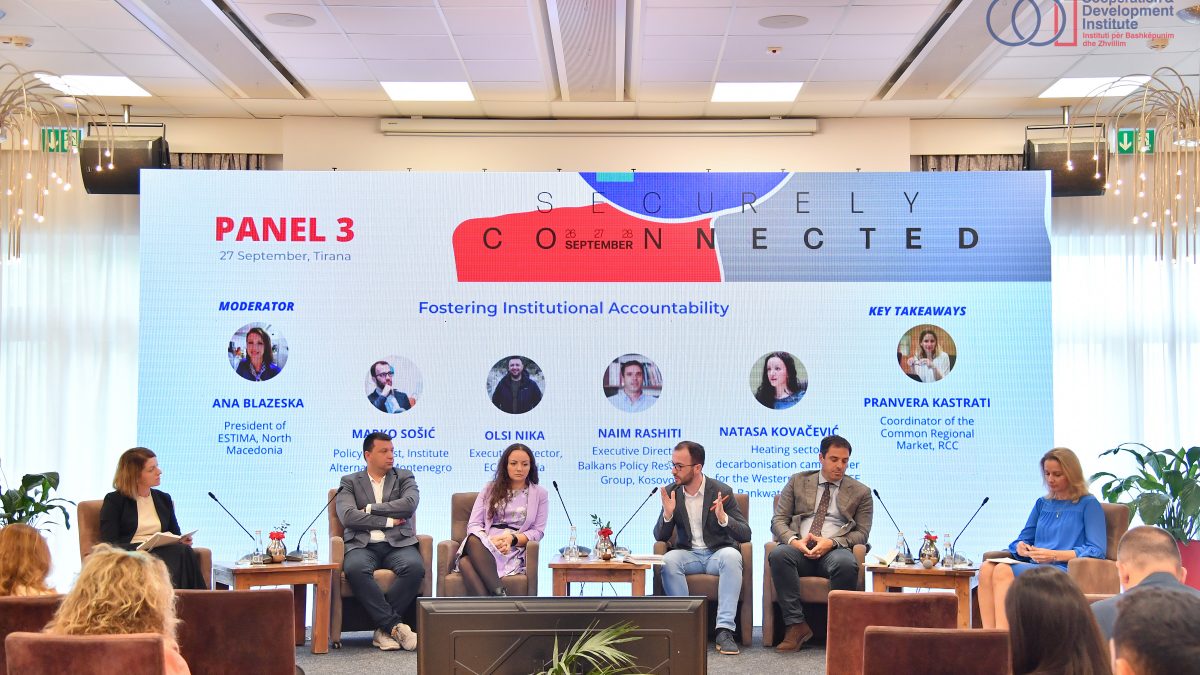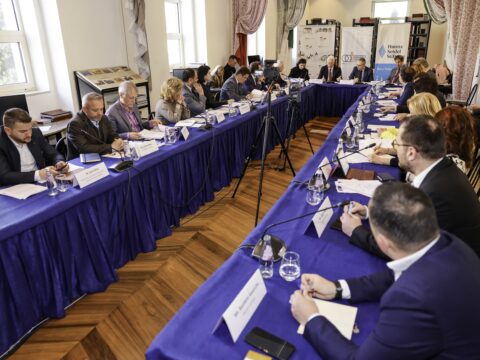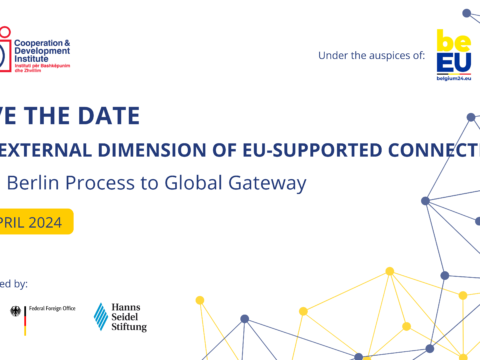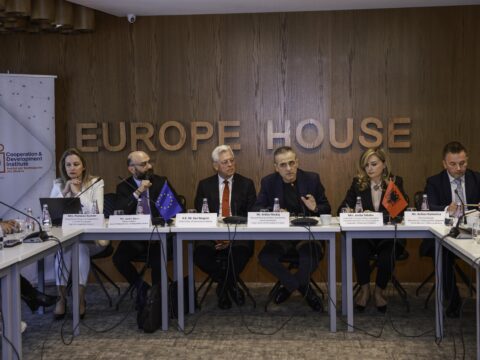30 September 2022
Main Highlight Day 2 Tirana Connectivity Forum 2022 – Secure and Well-Governed Institutions
Under the main title “Securely Connected” the second day of Tirana Connectivity Forum shifted the focus to civil society and their contribution to keeping the institutions healthy and well governed through CSO contribution in the efficiency of policy-making.
The day started with the keynote address by Mr Martin Dvorak, Deputy Minister of Foreign Affairs of the Czech Republic presenting the Czech Presidency priorities. Mr Dvorak pointed out the importance of connectivity to EU integration, underlined the contribution of RCC, of Common Regional Market and of the Berlin Process in the Enlargement, the commitment of the Czech Presidency of the EU to involve as much as possible WB6 institutions in the formulation of policies and specifically in the solution to the energy crisis, on the need for democratic institutions to provide room for civil society engagement.
In the following intervention lecture, Prof. Loukas Tsoukalis, President of ELIAMEP delivered the Lecture: “How the War in Ukraine affects Enlargement in WBs”. Prof. Tsoukalis, pointed out that to make Enlargement work, the EU will need a stronger center so as to make the decision-making process more feasible and that more differentiation inside the EU is required. At the same time, to make the process of enlargement smoother, a “stage by stage differentiation” could be the best scenario for candidate countries allowing them a progressive integration happening at every step, and not to wait till the end of the process for full membership.
With the Panel 3, the focus shifted on how CSO can effectively improve policy-making and infrastructure project implementation in the Western Balkans. Real-life examples at the national and at EU level illustrated by best cases were brought in by a panel of CSO representatives from the region.
Mr Olsi Nika, Executive Director ECO Albania, shared his experience on campaigning about the preservation of wild rivers in the Balkans against permanent transformation as in the case of Vjosa River, and how during this 10-year-long activism they have used an array of approaches to make the decision-makers pay attention to their cause. From protests to legal action to using media and artists to build alliances and create awareness was an impressive array of the means and approaches used of a successful and impactful CSO engagement.
We continued with valuable insight from Mr Marko Sošić, Policy Analyst, Institute Alternativa in Montenegro on the importance of increasing the level of transparency and availability of data in order to properly assess the government’s performance on infrastructure projects. Ms Natasa Kovačević, Heating sector decarbonization campaigner for the Western Balkans, CEE Bankwatch Network, presented her experience on how the involvement of the CSO in the cycle of projects and on building infrastructure can impact project financing and development by IFI.
The discussion continued with Mr Naim Rashiti Executive Director, Balkans Policy Research Group, Kosovo, who focused on the challenges that SEE6 countries face, the capacity of institutions, fragmentation and the takeover of administration from political elites being the main challenges. SEE6 countries should better coordinate to and develop workable mechanisms on how to approach and deal with different problems that affect all of them, and CSO sector can be a valuable contributor in that endeavour.
Ms Pranvera Kastrati, Senior Expert on Economic and Digital Connectivity / Coordinator of the Common Regional Market emphasized the role that CSO should have during the prep[aratin of the Action Plan of the Green Agenda. Beyond the watched role, CSO are expected to provide real contributions and in that light, RCC is planning to set up an NGO Forum on the Green Agenda.
The fourth panel’s main theme was policies and other countries’ best practices and these can help WB6 governments and especially think tanks and Civil Society Organizations to increase their capacity in policymaking.
Mr Márton Schőberl, Director General, Institute for Foreign Affairs and Trade – IFAT, Hungary, shared some core principles that can make lobbying way more effective. What CSO from SEE6 should take in consideration according to Mr Schőberl is to keep focused on set priorities; keep the contact with the permanent representation of their home countries and team up wherever possible.
Following Mr Schőberl, his colleague Mr Martin Vokálek, Executive Director, Institute for European Policy – EUROPEUM, Czech Republic, enforced the idea that there are many challenges in order for a case to be heard but building a network can be the first step to be seen in a complex environment such as Brussels.
Ms Marta Szpala, from the Center for Eastern Studies (OSW) stressed that the role of the think tank during the negotiations was to support the government by providing information and measuring the impact of certain legislation. Mrs. Szpala continue by mentioning best practices such as the Slovakian National Convention on European Integration which included civil society. This best practice was transferred also in the WB region, namely in Serbia and can be also used in other Balkan countries.
Mr Gilles Kittel, Team Leader – IPA, Enlargement Negotiations and EUSAIR (DG REGIO) presented the main components of the new Cross-border and Transnational programs under the MFF 2021-2027. Talking about the EU Strategy for the Adriatic and Ionian Region (EUSAIR) as a joint platform of 10 countries (EU Member State and WB), he underlined its innovative features as the a platform where the WB countries are in the same position as Member states. EUSAIR is also a platform where the CSOs voice can be heard not only at the government level but also in the EU level.
The afternoon session was opened with the “discussions on Building Inclusive Partnerships for Efficient Policy-Making”, which debated on how CSO and Think Tanks acting as citizen representatives’ proxies can contribute to improving policy-making in the region. This can be achieved by identifying and promoting entry points (such as Common Regional Market and Berlin Process 2.0) and identifying mechanisms and resources to increase citizens’ influence.
Ms Milica Uvalic, Professor, Department of Political Science, University of Perugia brought to the attention that the IPA III regulation itself underlines the importance of an inclusive approach and open dialog with civil society – IPA III provides space for bigger CSO participation. Mrs. Uvalic continues by emphasizing that EIP is a very ambitious plan, however, provides an adequate opportunity for civil society to step in with their expertise and knowledge in the relevant sectors. However, this needs to be done from the identification of projects, not only in the end of the preparatory phases or during implementation.
Mr Christian Hagemann, Executive Director of Southeast Europe Association (SOGDE), Munich pointed out that the continuation of the Berlin process 2.0 is an excellent sign of Europe’s commitment to the Enlargement process. This year’s Western Balkans summit will be hosted by Germany and will be preceded by working groups in the different fields such as green agenda, energy transition, climate change, sustainable development of the economy, as well as CSOs involvement in infrastructure processes. Mr. Hagemann, highlighted that the expertise must come from the CSOs in the region and later reflected in the upcoming steps. SOGDE will complement the CSO consultation with direct contacts and outreach amongst CSO and policy-makers at MS and / or EU level.
Ms Pranvera Kastrati, CRM Coordinator at Regional Cooperation Council mentioned that the Berlin Process in its genesis tries to bring the Western Balkan economies closer to one another and contribute through regional cooperation for a faster and smoother EU integration process. Furthermore, Ms Kastrati mentioned that the last survey “Balkan Barometer” showed that regional cooperation concretely contributes in supporting them toward EU integration. In that view, CRM uses an inclusive approach with regard to civil society, however further improvement in terms of outreach need to be developped.
Ms Dajana Cvjetkovic, CPCD BiH / Manager of the regional project SMART Balkans, explained that this project acts as an intermediate connection between the government and the CSOs in the region so as to empower civil society involvement in transformative and reform processes. This project has a different approach than others since it believes in the capacities of the CSOs by promoting local ownership as well as what CSOs can bring to the region in terms of expertise.
The “EU Member State WB6 Special Envoys” was chaired by Mr Dušan Reljić (Head of Brussels Office, SWP) who underlined that when talking about Enlargement Policy, we also need to talk also about cohesion of the region with the rest of the Member States.
Ambassador Sofia Grammata, Greek Special Envoy for Western Balkans, highlighted the positive influence that Greece has in the enlargement and brought to the attention the 2003 Thessaloniki agenda, where the enlargement process in favor of the WB started. Ambassador Grammata, brought to the attention the commitment of Greece to the success of reforms and a speedier Enlargement of the Western Balkans.
Ambassador Jurriaan Middelhoff, Dutch Regional Envoy for Stability in the Western Balkans emphasized the strict, fare and engaged approach that the Netherlands have with Enlargement of EU in the Western Balkans, and the support of his country to their progress towards full membership.
Ambassador Manuel Sarrazin, German Special Envoy for Western Balkans, underlined that the position of the German Chancellor on the need for an enlarged European Union to change and adapt, WB6 must carry on with their unwavering reforms actively and meaningfully supported by the EU. Enlargement remains the geopolitical instrument of EU.
The 8th edition of the TCF was supported by Hanns Seidel Foundation, Konrad Adenauer Foundation, Center of Excellence for Maritime Affairs, Heinrich Boell Foundation, Regional Cooperation Council and Tirana European Youth Capital 2022. TCF 2022 is part of the official calendar of the Czech Presidency and of the European Year of Youth.






